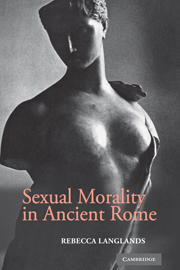Book contents
- Frontmatter
- Contents
- Acknowledgements
- Introduction
- Chapter 1 Sexual virtue on display I: the cults of pudicitia and honours for women
- Chapter 2 Traditional narratives and Livy's Roman history
- Chapter 3 Valerius Maximus: the complexities of past as paradigm
- Chapter 4 Subversive genres: testing the limits of pudicitia
- Chapter 5 Declamation: what part of ‘no’ do you understand?
- Chapter 6 Sexual virtue on display II: oratory and the speeches of Cicero
- Chapter 7 Imperial narratives, imperial interventions
- Conclusion
- Bibliography
- Subject index
- Index locorum
Chapter 6 - Sexual virtue on display II: oratory and the speeches of Cicero
Published online by Cambridge University Press: 22 September 2009
- Frontmatter
- Contents
- Acknowledgements
- Introduction
- Chapter 1 Sexual virtue on display I: the cults of pudicitia and honours for women
- Chapter 2 Traditional narratives and Livy's Roman history
- Chapter 3 Valerius Maximus: the complexities of past as paradigm
- Chapter 4 Subversive genres: testing the limits of pudicitia
- Chapter 5 Declamation: what part of ‘no’ do you understand?
- Chapter 6 Sexual virtue on display II: oratory and the speeches of Cicero
- Chapter 7 Imperial narratives, imperial interventions
- Conclusion
- Bibliography
- Subject index
- Index locorum
Summary
PUDICITIA AS CORE CIVIC VIRTUE
In the published works of Cicero the skills of rhetorical manipulation of pudicitia (developed through a training in declamation) are applied to real situations and people. Pudicitia turns out to be an important persuasive tool for the strategic characterisation of individuals and of state. In his rhetorical treatise The Classification of Rhetoric (De partitione oratoria) addressed to his nineteen-year-old son, Cicero cites as three examples of the things that are both good and necessary ‘life, pudicitia and freedom’. Earlier in the same work a quartet, also including pudicitia – piety, pudicitia, religion and the fatherland – is cited as representing those things on behalf of which actions may be rhetorically justified. Pudicitia holds the centre of these two formulae, where it is locked into the very essence of a Roman citizen's being (What Roman could exist without life or liberty? Or, it appears, without pudicitia?) and into the core of his relationship with the gods and nation. In earlier chapters, we have seen pudicitia closely associated with civic life, with libertas, and with cultivation of the gods; Cicero, understandably given the context of his written works, will make these aspects of pudicitia his focus. Yet an examination of the use of the term pudicitia in his works reveals a rather different emphasis from most of the material we have examined before: it is primarily on the moral behaviour of adult and politically active men rather than women or young people.
- Type
- Chapter
- Information
- Sexual Morality in Ancient Rome , pp. 281 - 318Publisher: Cambridge University PressPrint publication year: 2006



